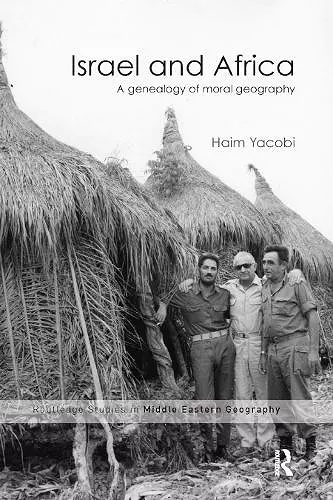Israel and Africa
A Genealogy of Moral Geography
Format:Paperback
Publisher:Taylor & Francis Ltd
Published:12th Dec '19
Currently unavailable, and unfortunately no date known when it will be back
This paperback is available in another edition too:
- Hardback£160.00(9781138902374)

Israel and Africa critically examines the ways in which Africa – as a geopolitical entity - is socially manufactured, collectively imagined but also culturally denied in Israeli politics. Its unique exploration of moral geography and its comprehensive, interdisciplinary research on the two countries offers new perspectives on Israeli history and society.
Through a genealogical investigation of the relationships between Israel and Africa, this book sheds light on the processes of nationalism, development and modernization, exploring Africa’s role as an instrument in the constant re-shaping of Zionism. Through looking at "Israel in Africa" as well as "Africa in Israel", it provides insightful analysis on the demarcation of Israel's ethnic boundaries and identity formation as well as proposing the different practices, from architectural influences to the arms trade, that have formed the geopolitical concept of "Africa". It is through these practices that Israel reproduces its internal racial and ethnic boundaries and spaces, contributing to its geographical imagination as detached not solely from the Middle East but also from its African connections.
This book would be of interest to students and scholars of Middle East and Jewish Studies, as well as Post-colonial Studies, Geography and Architectural History.
Haim Yacobi’s book brings a welcome addition to our understanding of the complex ways in which Africa has informed the construction of identities elsewhere. Admitting that there are parallels with the "orientalist gaze" through which Europe has looked upon Africa, this book effectively highlights the specificity of the Israeli case. It discusses in a crystal clear way how throughout the 20th century Israel constructed an "idea of Africa" in order to define its own identity and how today the "Africa in Israel" issue remains very much at the heart of Israeli politics. Yacobi asks unsettling questions on contemporary stances towards Africa that are not only relevant for the Israeli context, but have wider ramifications. The book does not only provides new knowledge on a hitherto little known topic, but also offers a stimulating theoretical framework that will trigger new scholarly debate, especially on 20th century architecture history in/on Sub-Saharan Africa.
Prof. Johan Lagae, Department of Architecture and Urban Planning, Ghent University
In this thought provoking book, Haim Yacobi takes us on a fascinating journey into the African presence in Israel and the Israeli presence in Africa. Charting a series of back and forth movements between Africa and Israel – involving diplomats, refugees, curators, migrants, architects and planners – Yacobi investigates Africa’s role in the production of Israeli "moral geographies." The book is an important addition to the debate on colonial discourse and practices in Israel, demonstrating how colonial practices of militarised nation-building and modernist planning were exported from Israel to Africa, and presented there as tools of decolonisation. Israel’s fascination-rejection relationship with Africa exposes the profound ambiguities at the heart of the Israeli project itself.
Dr. Yair Wallach, Pears Lecturer in Israeli Studies, SOAS, University o
ISBN: 9780367869045
Dimensions: unknown
Weight: 240g
156 pages